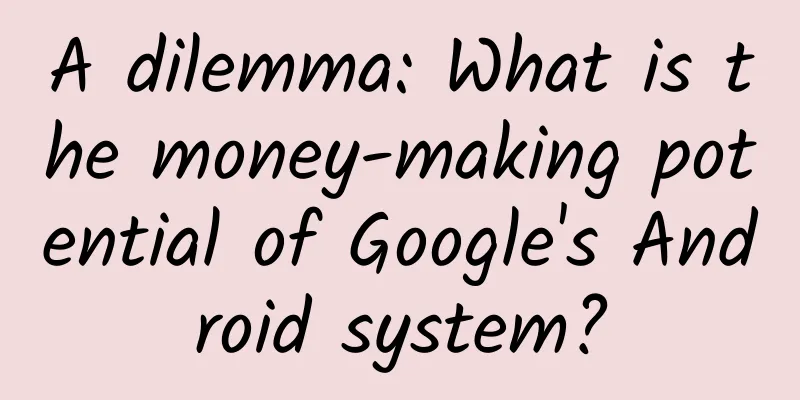A dilemma: What is the money-making potential of Google's Android system?

|
According to data from market research firm Strategy Analytics, 84% of smartphones shipped worldwide in the third quarter ran Google's Android operating system, slightly lower than 85% in the second quarter. In this regard, some industry analysts believe that Google's monopoly in the global smartphone market seems to have peaked, and Google will seek control over Android next. To put it bluntly, Android, the largest mobile Internet platform, needs to find more ways to make money. The industry knows that Android's great advantage in the mobile Internet market is inseparable from the open source and free Android system. But it is precisely because the system itself is open source that anyone can modify it and adjust the underlying code. Therefore, with the continuous development of Android, the so-called "de-Googleization" in the industry, that is, deeply customized Android, is becoming more and more popular. The biggest impact of "de-Googleization" on Android is that these manufacturers are building their own "Android ecosystem" in the name of Android. But this has seriously affected Google's "money" prospects when it released Android. Because according to Google's original intention at the time, it hoped to expand the Android platform with the help of open source and free, and then make profits through Google's applications on the platform (to be precise, through advertisements on Google applications). Unfortunately, most of the deeply customized Android ecosystems have abandoned these applications that can bring real commercial value to Google. Of course, Google has realized this. It recently launched Android One phones for the low-end market in India, and has even been persistent in releasing Project Ara modular phones next year. The ultimate goal may be to allow related manufacturers to use native Android or Google's native Android-based applications. But we think it's too late for Google to make money from Android. First of all, judging from the two ongoing projects, Android One and modular phones, there is not much market. For example, for Android One, although India is recognized by the industry as the largest market with the greatest growth potential in the world, relevant Chinese manufacturers will undoubtedly also regard India as one of the key overseas markets to be developed. The recent hot sales of Xiaomi phones in China in this market and the resulting Indian market users believe that Chinese mobile phone manufacturers' smartphones are more cost-effective than low-end phones based on Android One, the prospects for Android One are not optimistic. What is important is that once Chinese manufacturers enter emerging markets such as India and gain recognition from the local market and users, given that Chinese mobile phone manufacturers are almost all deeply customized Android models (their own customized Android systems and applications), then Google's so-called "money" prospects for the next 1 billion Android users will once again become a bubble. If Android One is Google's way of regaining "money" through the system (software) itself, then Project Ara modular phones are a combination of software and hardware (the phone itself and the native Android system). However, due to the fierce competition, high standardization, numerous manufacturers and varieties, and falling prices in the current smartphone market, Project Ara has few unique advantages. Even if there is a certain market, it is an extremely niche market. Compared with the increasingly popular and out-of-control deeply customized Android systems and manufacturers, how much "money" can Project Ara save for Google? Faced with the above-mentioned "money" prospects with little effect, will Google change its Android strategy? As mentioned above, since Google Android is an open source system, it is natural to allow relevant manufacturers to customize it, but the contradiction that follows is that once manufacturers deeply customize it, it means that the applications related to Google's "money" prospects will be third-party, that is, bypassing or abandoning Google applications that can bring "money" prospects to Google. Next, can Google follow Microsoft's practice of Windows in the PC industry or ARM licensing in the mobile chip field to charge Android licensing fees? This is possible, but the fee cannot be too high. Moreover, Microsoft's Windows Phone system has been announced to be free. Android, which has been free before, suddenly charges a fee. First, it goes against the principle of open source, and second, there are uncontrollable risks contained in it (for example, will manufacturers lose because of this? Or will they customize more deeply after purchasing the license?). Therefore, the possibility of Google controlling its "money" prospects from the system itself is very small. So is it feasible in terms of applications? For example, forcing manufacturers to pre-install Google's applications and put them on the first screen of smartphone screens (Google did ask some manufacturers to do this before). Let's not talk about the final effect here (after all, there are many third-party applications that can replace Google applications). If Google really does this, it is very likely to face an antitrust investigation. You must know that the European Union has always been concerned about Android's dominant position in the mobile Internet, and there are constant news about the launch of an investigation into Android's monopoly. Don't forget that the EU's investigation into Microsoft's Windows monopoly was about its bundling of its own IE browser (application) in Windows. In the end, Google still allows the emergence of third-party applications, at least to appear on the first screen of smart terminals at the same time as Google's own applications. In summary, we believe that Google Android has fallen into a dilemma as it has developed to this day. If it continues to allow Android to grow wildly (mainly due to the deep customization of Android), its "money" prospects will become increasingly slim; if it tightens Android, the various negative effects it causes will not only fail to bring it considerable "money" prospects, but may even outweigh the gains. Perhaps Google's Android strategy (open source and free) was doomed to have no "money" prospects from the beginning, but this is in line with Google's CEO Larry Page's recent statement that Google is still adhering to the principle of selflessness. Seeing this, we can only laugh. As a winner of Toutiao's Qingyun Plan and Baijiahao's Bai+ Plan, the 2019 Baidu Digital Author of the Year, the Baijiahao's Most Popular Author in the Technology Field, the 2019 Sogou Technology and Culture Author, and the 2021 Baijiahao Quarterly Influential Creator, he has won many awards, including the 2013 Sohu Best Industry Media Person, the 2015 China New Media Entrepreneurship Competition Beijing Third Place, the 2015 Guangmang Experience Award, the 2015 China New Media Entrepreneurship Competition Finals Third Place, and the 2018 Baidu Dynamic Annual Powerful Celebrity. |
<<: Sony Mobile China is caught in a layoff storm: business is not good and employees are anxious
>>: Thinner and thinner! Why do domestic mobile phones keep breaking thickness records?
Recommend
APP promotion and operation: a complete analysis of the user growth system!
The user growth system is a mechanism that record...
Zhihu product analysis report!
Preface As Internet traffic has peaked, new traff...
A guide to gaining followers through short videos!
Today I’m sharing with you a “Short Video Fan Exp...
What are the ranking factors for link popularity of a specific page?
The ranking factors for link popularity of a spec...
After refuting the relationship rumors, Zhang Ming En appeared in Hu Bingqing's residential area and left immediately when he saw the candid photos!
On June 23, Zhang Ming'en was photographed ag...
The big shell hidden by Tang Monk in Tongtian River in "Journey to the West" is actually a first-class national treasure!
Recently, a giant clam weighing 1.5 kilograms was...
Android 14 new features exposed: support for tablets and foldable phones to switch taskbar mode
June 29 news, according to the latest Android 14 ...
How did Starbucks resolve the crisis of rumors in just 24 hours?
The highest level of public relations is to go wi...
4 major mainstream platform information flow optimization cases, this wave of dry goods is very timely~
For information flow advertising , the content an...
Offline traffic: the core value of elevator advertising!
In the fragmented era of mobile Internet, we chec...
Experts point out four major problems in home kitchens. Are you affected?
Data shows that the oil and salt intake of Chines...
How scary are the bugs that burrow into your body?
Addendum 1: There are not only liver flukes, but ...
Baidu bidding industry fixed investment
Recently, several friends left messages on our pu...
Don’t be afraid if you have fatty liver! Learn these few tips to get the fat out of your liver
Current status of fatty liver disease in my count...
How long will it take to prepare for pregnancy after testing positive for COVID-19?
One minute with the doctor, the postures are cons...









